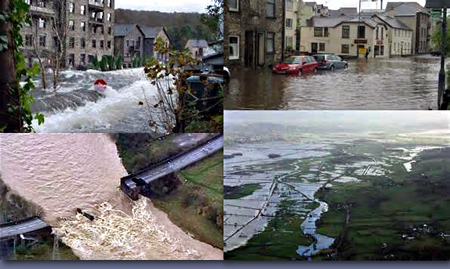Following the devastating floods in Cumbria, particularly in Keswick, Kendal, Appleby, Cockermouth, Penrith, Carlisle, Lancaster and Morecambe in the North West of England, the Health, Safety and Environment Department has contacted all employers stressing the importance of getting out Safety Communications to members as soon as possible.

This is required in order to ensure the safety of those working in affected areas as well as supporting and looking after the welfare and wellbeing of affected staff who may also be flooded out at home as well as at the workplace.
The CWU have stated that the Union is keen to work together with all employers on this.
The rain continues to fall, combined with extremely high winds and weather forecasts indicate continued wet and windy conditions.
Around 50 Severe Weather Warnings remain in place after record UK rain falls led to the River Eden and other rivers breaking their banks over the weekend, breaching flood defences put in place after previous floods.
Power supply has been cut to thousands of homes as electricity power sub-stations were flooded and at the time of writing, Emergency Services, the Army and volunteers are working to rescue stranded people and engineers are working to restore power supply.
The CWU Health, Safety and Environment department is issuing advice and guidance via Letters To Branches, and will be sharing this with all employers as was done during previous floods and subsequently used by Royal Mail Group in their communications and briefings as well as in the Severe Weather Risk Assessment.
CWU - Basic Flood Safety Guidance
- Turn Around, Don’t Drown!
- Avoid walking or driving through flood waters.
- Don’t walk in floodwater. Just 6 inches of moving water can knock you down and water above knee level will easily knock you off your feet.
- Flood water can cover open manholes, open drains. potholes, road works or objects and you won’t be able to see them.
- Don’t drive through floodwater. Two feet of flowing water is enough to sweep your van or car away.
- If there is a chance of flash flooding, move immediately to higher ground. Flash floods can kill.
- If floodwaters rise around your vehicle but the water is not moving, abandon the vehicle and move to higher ground. However - Do not leave the vehicle and enter moving, fast flowing water as there's a high risk of being washed away and drowning.
- Avoid driving and parking alongside streams, rivers, and creeks during heavy rainfall. These areas can flood quickly and with little warning.
- Don’t touch items that have been in contact with the flood water. Flood water is likely to be contaminated and could contain sewage. Disinfect and thoroughly clean everything that’s got wet.
The CWU has communicated this advice to Royal Mail Group and asks all Branches and ASRs to ensure the guidance and advice is widely circulated among members in the affected areas.
Source: CWU